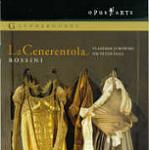This new Cenerentola from Glyndebourne has some nice things to recommend it, but it cannot compare with the best on DVD/Video. Although Cenerentola is one of Rossini’s darker comedies–our heroine is severely abused and relies on tact, luck, and her innate goodness to survive, and has as her nemeses two vile stepsisters and a stepfather who claims she’s dead–this production takes it one step further: it is almost devoid of humor. Every so often the lighting changes drastically, throwing the stage into darkness with blue spots on the principals; coupled with their makeup, the baddies appear vaguely like vampires.
Peter Hall’s direction makes Cenerentola’s family into really vile characters; they may be awful, but after all, this is a comic opera, or at least an opera filled with comedy. Cenerentola and the Prince sing warmly and tenderly to one another from opposite ends of the stage when they meet. Dandini (as the Prince) and his Courtiers wear ugly, frightening masks and Dandini feels up the ugly step-sisters immediately. If Hall was looking to avoid the usual buffo behavior, it worked, but he’s substituted sheer unpleasantness.
About Ruxandra Donose’s Cinderella there is little to criticize. She has an appealing light mezzo with a strong, bright top and can handle all of Rossini’s fiorature with ease. But she lacks charisma, both dramatically and vocally–Frederica von Stade and Cecilia Bartoli on other videos warm the heart, while Donose just sings well and refuses to glisten. Her Ramiro is first rate. Russian tenor Maxim Mironov looks a bit awkward, but he’s a terrific singer, a real tenore di grazia, with a top secure enough to interpolate notes above the written high-Cs in his big aria. He’s somewhere near the league of Juan Diego Florez, and that’s quite a league.
Luciano di Pasquale’s Magnifico looks like Pavarotti on a bender, and while he has the coloratura, he doesn’t seem entirely at ease with it, and he bullies his way through the part. Simone Alberghini’s Dandini is good enough, but his voice lacks brightness. The rest of the cast is good, although the sisters overdo their nastiness.
Vladimir Jurowski leads with attention to detail, but he too does not exude warmth: his meticulousness comes across as automatic. Sound (LPCM Stereo; 5.1 Surround) and picture are excellent; subtitles are in major European languages and English. Go for Stade with Abbado, or Bartoli, although the latter production is somewhat lackluster.
































